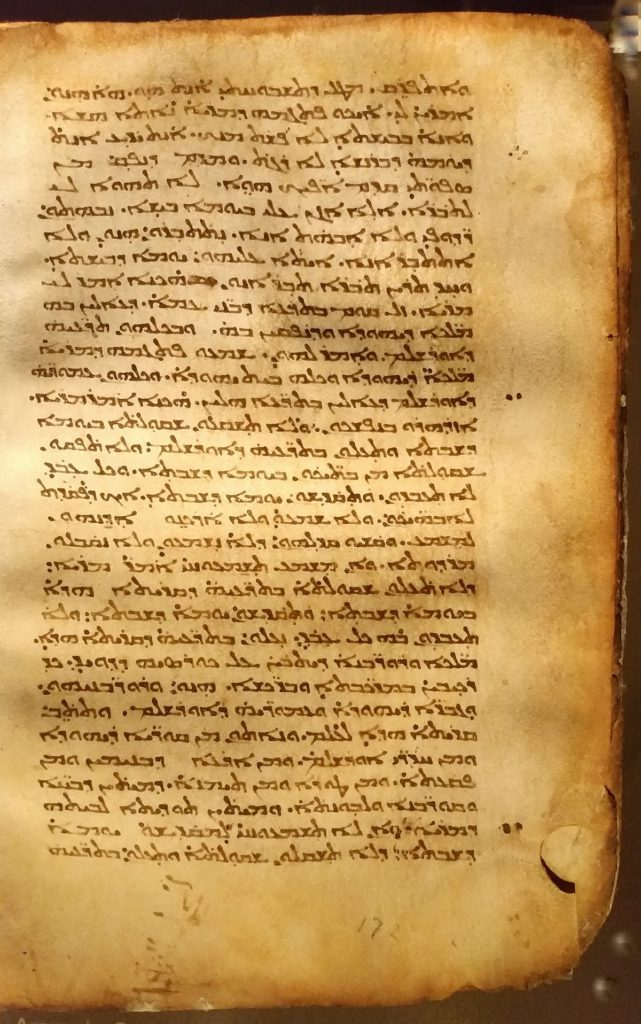
Codex Phillipps 1388 is one of the oldest extant copies of the Peshitta version of the Four Gospels dating to the 5th to 6th centuries. It is in the Staatsbibliothek in Berlin which sheds some important light on NT origins, especially for those of us who subscribe to Aramaic Primacy for much of the NT. (The picture above is a page of a Peshitta ms. but not actually Phillipps 1388)
Now you may have heard from certain Peshitta Primacists that all Peshitta manuscripts agree exactly, or that the Old Syriac and Peshitta versions are totally independent textual traditions. I have long maintained that both of these claims are false.
Peshitta manuscripts contain variants, just like Greek manuscripts. In fact the oldest Peshitta manuscripts contain even more variants.
Moreover the Peshitta version is not an independent textual tradition, but a revision of the Old Syriac version, created to bring the Aramaic into closer harmony with the Byzantine type Greek text.
It is well acknowledged that the Peshitta Gospels are a revision of the Old Syriac Gospels. As Voobus states:
The Peshitta is not a new translation, but a revision of the Old Syriac
version. … As the result of this revision, digressions were eliminated,
additions removed, omissions supplemented and peculiarities retouched.
Through this process the Peshitta lost its former singularities and variants
which were much cherished and so deeply rooted in Syriac textual traditions.
After this process, the text assumed a wholly new complexion, conforming
more or less to the Greek… This distinguishes the Peshitta from the
Old Syriac. Its back is turned on the ancient and endeared traditions,
and its face is decidedly turned toward the Greek form. …
…many idiomatic expressions found in the Old Syriac, particularly
the conjunctive construction over against the use of the infinitive, and
the predilection towards the nominal sentence, have been modified
and adapted more to the Greek. But… much of the idiomatic phraseology…
was still retained.
(Early Versions of the New Testament; Manuscript Studies;
Arthur Voobus; 1954 pp. 97-98 )
Kenyon says of this revision:
…he [the Peshitta redactor] must have used Greek MSS.
of a different family from that which is represented by
the Old Syriac. This [Old Syriac], as we have seen, belongs
to the d-type [Western Type], agreeing mainly with
[Codex] D and the Old Latin, and often also with [Codecies]
) [and] B; while the Peshitto ranges itself rather with the
authorities of the a-type [Byzantine Type].
(Handbook to the Textual Criticism of the New Testament;
Sir Frederic G. Kenyon, K.C.B., F.B.A.; 1951 p. 164)
In my recent research I have been taking a closer look at Codex Phillipps 1388. This is one of the oldest Peshitta manuscripts, and it contains a great many variant readings. More importantly, many of these variant readings are Old Syriac readings, thus providing “freeze frame” manuscript evidence that the Peshitta and Old Syriac are in fact part of the same Aramaic textual tradition.
This information is truly exciting. It means that there is much to be gained through a critical analysis of the variant readings found in the oldest Peshitta manuscripts. Using these Peshitta manuscripts and the Old Syriac together, a critical edition could be compiled creating a critical text, which as closely as possible, reproduces the original Aramaic text.

Donations are very low this month and our rent will be due in just ten days. We need your help today!
As you know we have been digging ourselves out of a budget shortfall. As I have said to you many times, I look on this work as a co-operative one with me, and all of you combining our resources together in order to get the job done of helping to teach this great truth to all in the world who will listen. Thank you so much from the bottom of my heart for your continued support, you are the ones who make it all possible by your contributions and your prayers for our work. I truly appreciate your help in every way.
If you can make a one time donation of $500 or $1,000 dollars to support this work.
